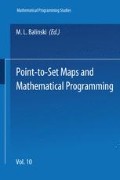Abstract
In this paper, we examine the relationships between the fixed point set of a point-to-set map A(·), and the asymptotic properties of the sequences which may be iteratively generated by using the map A(·). Let L be the set of all limit points, and Q be the set of all cluster points of all sequences which may be iteratively generated by A(·). The consequences of various assumptions on the map A(·) and the sequences generated by A(·) on lower-bounds and upper-bounds for L and Q are discussed.
Preview
Unable to display preview. Download preview PDF.
References
C. Berge, Espaces topologiques—functions multivoques (Dunod, Paris, 1966).
G. Debreu, Theory of Value, Cowles Foundations, Monograph 17, (Wiley, New York, 1959).
B.C. Eaves and W.I. Zangwill, “Generalized cutting plane algorithms”, SIAM Journal of Control 9 (1971) 529–542.
H. Hermes, “Calculus of set valued functions and control”, Journal of Mathematics and Mechanics 18 (1968) 47–59.
W.W. Hogan, “Point-to-set maps in mathematical programming”, SIAM Review 15 (1973) 591–603.
P. Huard, “Optimization algorithms and point-to-set maps”, Mathematical Programming 8 (1975) 308–331.
P. Huard, Cours de 3eme cycle, lere partie, elements theoriques, Université de Lille I (France) Janvier 1972.
P. Huard, Cours de 3eme cycle, 2eme partie, algorithmes generaux, Université de Lille I (France) Janvier 1972.
S. Kakutani, “A generalization of Brouwer’s fixed point theorem”, Duke Mathematical Journal 8 (1941) 457–459.
D.G. Luenberger, Introduction to linear and nonlinear programming (Addison-Wesley, Reading, MA, 1973).
G.G.L. Meyer, “Algorithm model for penalty functions-type iterative procedures”, Journal of Computer and System Sciences 9 (1974) 20–30.
G.G.L. Meyer, “A canonical structure for iterative procedures”, Journal of Mathematical Analysis and Applications 52 (1975) 120–128.
G.G.L. Meyer, “A systematic approach to the synthesis of algorithms”, Numerische Mathematik 24 (1975) 277–289.
G.G.L. Meyer, “Conditions de convergence pour les algorithmes iteratifs monotones, autonomes et non deterministes”, Revue Francaise d’Automatique, Informatique et Recherche Operationnelle, Analyse Numerique 11 (1977) 61–74.
G.G.L. Meyer, “Convergence conditions for a type of algorithm model”, SIAM Journal on Control and Optimization 15 (1977) 779–784.
G.G.L. Meyer and E. Polak, “Abstract models for the synthesis of optimization algorithms”, SIAM Journal of Control 9 (1971) 547–560.
G.G.L. Meyer and R.C. Raup, “On the structure of cluster point sets of iteratively generated sequences”, Journal of Optimization Theory and Applications, to be published.
R.R. Meyer, “The validity of a family of optimization methods”, SIAM Journal on Control 8 (1979) 41–54.
R.R. Meyer, “Sufficient conditions for the convergence of monotonic mathematical programming algorithms, Technical Report 220, Computer Science Department, University of Wisconsin, Madison, WI.
E. Michael, “Topologies on spaces of subsets”, Transactions American Mathematical Society 71 (1951) 152–182.
A.M. Ostrowski, “Solution of equations and systems of equations (Academic Press, New York, 1966).
E. Polak, “On the convergence of optimization algorithms”, Revue Francaise d’Automatique, Informatique et Recherche Operationnelle 16 (1969) 17–34.
E. Polak, Computational methods in optimization: a unified approach (Academic Press, New York, 1971).
B.T. Polyak, “Gradient methods for the minimization of functionals”, U.S.S.R. Computational Mathematics and Mathematical Physics 3 (1963) 864–878.
W.I. Zangwill, “Convergence conditions for nonlinear programming algorithms”, Working Paper No. 197, Center for Research in Management Science, University of California, Berkeley, November 1966.
W.I. Zangwill, Nonlinear programming: a unified approach (Prentice Hall, Englewood Cliffs, NJ, 1969).
Author information
Authors and Affiliations
Editor information
Rights and permissions
Copyright information
© 1979 The Mathematical Programming Society
About this chapter
Cite this chapter
Meyer, G.G.L. (1979). Asymptotic properties of sequences iteratively generated by point-to-set maps. In: Huard, P. (eds) Point-to-Set Maps and Mathematical Programming. Mathematical Programming Studies, vol 10. Springer, Berlin, Heidelberg. https://doi.org/10.1007/BFb0120849
Download citation
DOI: https://doi.org/10.1007/BFb0120849
Received:
Revised:
Published:
Publisher Name: Springer, Berlin, Heidelberg
Print ISBN: 978-3-642-00797-2
Online ISBN: 978-3-642-00798-9
eBook Packages: Springer Book Archive

